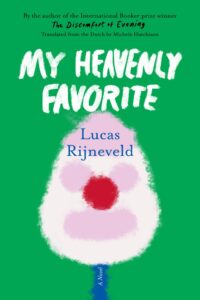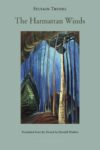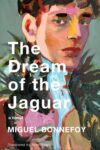
[Graywolf Press; 2025]
Tr. from the Dutch by Michele Huthinson
Dutch author Lucas Rijneveld became an overnight sensation after winning the International Booker Prize in 2020. Their debut novel, The Discomfort of Evening, quickly gained notoriety for its shocking portrayal of ten-year-old Jas and her siblings’ shattering transgressions of animal cruelty and sexual experimentation in rural Netherlands. The win garnered plenty of press attention, due, in part, to Rijneveld being far from a stereotypical prize-winning author. Already an established poet in the Netherlands, Rijneveld was only twenty-eight when The Discomfort of Evening was published. Two years later, Michele Hutchinson’s English translation appeared and brought the author a global readership who quickly recognized their talent. Photographs of Rijneveld appeared in the media, showing a surprisingly youthful, androgynous looking figure. Rijneveld, who is non-binary, has said that growing up they wanted to be both a girl and a boy. Headlines alluded to personal revelations, an admittance that much of Rijneveld’s writing is based on their own experiences growing up on a farm with a deeply religious Reformed Protestant family. A family who, Rijneveld admits, did not read their debut.
Rijneveld’s follow up, My Heavenly Favorite, also translated by Hutchinson, is a story of return, set once again in a rural, religious community. If Rijneveld’s family was too scared to read their first book, I imagine they would be terrified to approach this one. Here, Rijneveld gives voice to a forty-nine-year-old narrator, a local veterinarian and paedophile. His sexual obsession with a twelve-year-old farmer’s daughter — the eponymous “favorite” — is revealed in an outpouring of eloquent, disturbed lyricism. Unbroken sentences flow over page after page with Bernhardian density, broken into forty-two short chapters.
Comparisons with Lolita are inevitable and intentional, especially when Humbert Humbert’s words are nearly plagiarized in the text: the vet repeatedly tells the muse that “you were the fire of my loins” and the Nabakovian use of playful monikers for characters and body parts (Putto, prong, heavenly favourite) are used throughout. While probably the most famous, Nabakov isn’t the only writer to have a paedophilic narrator. A.M Holmes’ The End of Alice is another good example, but it is Lolita that My Heavenly Favorite speaks to directly. Still, this isn’t a spinoff — Rijneveld’s novel stands on its own.
Set in the Summer of 2005, a Beckett-reading veterinarian, married with two children, describes the obsessional, sexual relationship he inflicts on a twelve-year-old girl. Like Wilde’s De Profundis, this is a literal prison letter, an account that provides both explanation and evaluation of the events that led to the narrator’s incarceration. On first seeing his beloved in a field, he says in earnest, “You lay like a breached calf in the nursery of my degenerate desires.” The use of oddly judged veterinary analogies is frequent and a contrast to the sweetness of his names he uses for the child. She is his heavenly favourite, his chosen one, his Putto. A word for a naked child, a cherub. He pursues her with attention and gifts. He gives her a secret pay-as-you-go phone that causes him to worry she might have “seen the monster hidden behind the virtue,” but he cannot be dissuaded. His fear is ineffective. A first, forced kiss is met with resistance, which he compares to the time he had to “inject anti-maggot meds” into the mouths of animals. The narrator applies the same force and brutality he would to an animal: “I let my body fall onto you and you couldn’t move and I was sure you didn’t want to escape.”
Throughout the novel, the narrator is haunted by memories of a dead farmer’s blue face he saw hanging in a barn after losing his cattle in the aftermath of the 2001 foot and mouth disease outbreak. The culling of more than 6 million animals across Europe, devastated farming communities, something which Rijneveld also used as a backdrop in their earlier work. The vet acknowledges he was sexually abused himself, by his mother when he was a child. He understands that this robbed him of his innocence, which he wants to recapture. He insists his mother “planted an insatiable longing in me, a permanent hurt that I tried to heal with you … inside there was a small needy boy who just wanted to have fun with you, but my suffocating lust got in the way.” Any attempt to excuse the vet by way of his damaged childhood is undercut by his continual admittance that he understands his desires are abusive, but still will not stop himself from satiating them. As a reader, to spend so much time with this man’s mind is troubling. Still, the rhythmical intensity of Rijneveld’s prose is so striking, the reader can’t help being captivated by this disturbed yet poetic man. As uncomfortable as it is to admit, there is pleasure in his company.
It is very different company to that of the favorite, who understands the world through what she sees and hears in books and on television. The favorite calls the vet Kurt, after Kurt Cobain. Pop culture references appear everywhere, reminding us of the specific time, twenty years ago, when Rijneveld would have been a young teenager themselves. These references also remind us that the character is a child. While “Kurt” masturbates into the pages of Swann’s Way, the object of his love is reading Roald Dahl stories and listening to Avril Lavigne. She is scared by Stephen King’s It and enthralled by Kate Bush’s Wuthering Heights. She develops a deep interest in Hitler, who, like Rijneveld, she shares a birthday with and who she feels an odd connection to.
This isn’t the only occasion her life mirrors the author. Like Rijneveld, the favorite is deeply affected by the loss of a young sibling and has begun to question her gender identity, “wavering between a boy and a girl.” It perhaps says something about Rijneveld’s own sense of victimhood and how a particular upbringing might shape a reality. Presumably unlike Rijneveld, the favorite is also a troubled fantasist who believes she can fly and that she was the one who crashed into the second twin tower in New York on 9/11, rather than a plane. Kurt knows how damaged and vulnerable she is; the girl actually asks to be dissected on his surgery table. “You have to cut me open,” she begs. Her troubling thoughts do not disturb him; they are to be exploited and provide an opportunity for abuse. He is only able to finally have sex with her through a cruel manipulation, convincing her that from his seed she will grow a penis of her own: “you looked down in the hope of seeing something growing, I said it was the same as with a swan, it was hidden inside you and would come out when you made love.” A desire that began from afar and ends in physical depravity, he still considers it an act of love.
The mastery of My Heavenly Favorite is its ability to disarm. It manages to be grubby and visceral, like an unrated B movie, created to shock, where the bodies of people and animals are often reduced to fluid and want and humanity is portrayed as incredibly cruel. Dissecting an otter’s penis with the favorite, for example, the narrator says:
I saw you shimmer, I saw you shining deliciously, my precious creature, and then I slid the scalpel along the tip and cut it away from the fur slightly to show you and I left the rest to you; I didn’t know how to breathe, neither of us knew how to breathe, and my mistake was I didn’t see any difference in this.
A tale of grief and pain, it is impossible not to connect with these characters, to exist within the horror and find an experience of rapture there. This connection is surprising and says something about the way a reader can experience language as a feeling. It’s a relationship to the text that allows beauty and vulgarity to co-exist, to be both appalled and euphoric at the same time. Their relationship is one of abuser and abused, but also sufferer and suffering, they have both misread the world, found themselves unhinged from reality. There is humanity in the sickness. Rijneveld is able to capture it like few other writers can.
Simon Lowe is a British writer. His stories have appeared in EX/Post, Breakwater Review, AMP, Akashic Books online, Ponder Review, and elsewhere. His novel, The World is at War, Again, was published June 2021 (Elsewhen Press).
This post may contain affiliate links.






